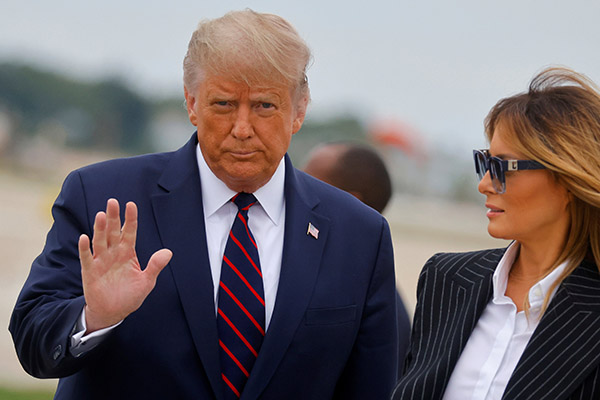
VALLEY STREAM, NY — A day after President Trump announced that he and his wife, Melania, had tested positive for COVID-19, an infectious disease specialist with the Catholic Medical Association weighed-in on what the president might face in the upcoming weeks.
Dr. Robert Taballi, who conducts the “Ask the Doctor” segment on Currents News, commented on the timing of the diagnosis.
“He was probably diagnosed within three days of contracting the disease,” Dr. Taballi told The Tablet.
The president announced that he and First Lady Melania Trump tested positive for coronavirus in a Twitter message posted early Friday morning, just 32 days before Election Day.
“Tonight, @FLOTUS and I tested positive for COVID-19. We will begin our quarantine and recovery process immediately. We will get through this TOGETHER!,” the president’s message said.
Tonight, @FLOTUS and I tested positive for COVID-19. We will begin our quarantine and recovery process immediately. We will get through this TOGETHER!
— Donald J. Trump (@realDonaldTrump) October 2, 2020
Dr. Tiballi said that he was surprised the president tested positive because the people around him are constantly tested. At the same time, Dr. Taballi said that, given the fact that those measures proved ineffective, it is surprising that this didn’t happen earlier.
Prime Minister of the United Kingdom Boris Johnson, 56, and Brazilian President Jair Bolsonaro, 65, previously tested positive to the coronavirus during the pandemic and recovered. Both of them are younger than president Trump, who is 74.
“I’m concerned because of his age and his weight,” Dr. Taballi said, “but at the same time he doesn’t have diabetes, hypertension or heart or lung diseases, and he has been deemed to be in a good health in previous medical reports. He should recover.”
[Related: President Trump and First Lady Test Positive for Coronavirus]
Dr. Bob Wachter, chair of the department of medicine at UC San Francisco commented on the risk the president faces due to his age in an interview with WIRED: “Compared to an 18- to 29-year-old, someone aged 73 is about 5 times more likely to be hospitalized and about 90 times more likely to die of COVID. Once you’re up to age 75, that death number becomes 220 times more likely to die.”
In an interview “Squawk Box,” the CNBC morning news and talk program, the former FDA chief in the Trump administration Dr. Scott Gottlieb speculated that White House doctors would probably consider giving President Trump remdesivir, the antiviral drug approved for treating Covid-19 under emergency use authorization. The White House has not revealed any details about possible treatments for the president yet.
“Remdesivir is indicated for hospitalized patients,” Dr. Gottlieb said. “But there is thinking that it probably improves outcomes the earlier it is introduced in the course of the disease.”
The corticosteroid called dexamethasone has been shown to reduce overall mortality, but doctors don’t use steroids in the early stages of the disease. Dr. Taballi pointed out that steroids don’t help patients before they have shown symptoms of COVID-19.
The original statement from the White House physician, Dr. Sean P. Conley, said Mr. Trump was “well” but didn’t indicate whether he was experiencing symptoms. Later The New York Times reported that the president was “experiencing cold-like symptoms” according to two people familiar with his condition.
COVID-19 mild symptoms may appear two to 14 days after exposure to the virus and include fever or chills, cough, shortness of breath or difficulty breathing, fatigue, muscle or body aches, headache, loss of taste or smell, sore throat, congestion or runny nose, nausea or vomiting, and diarrhea.
